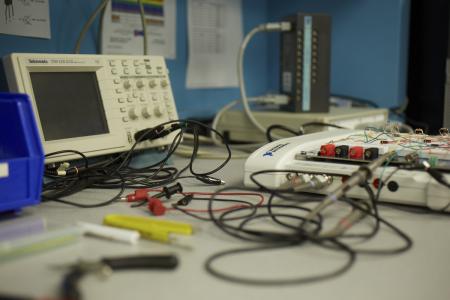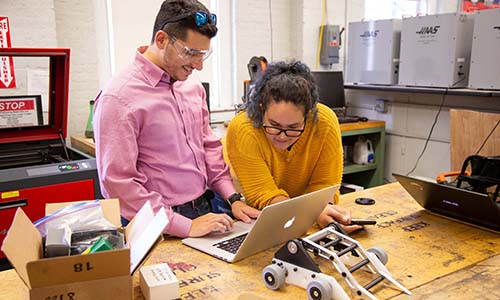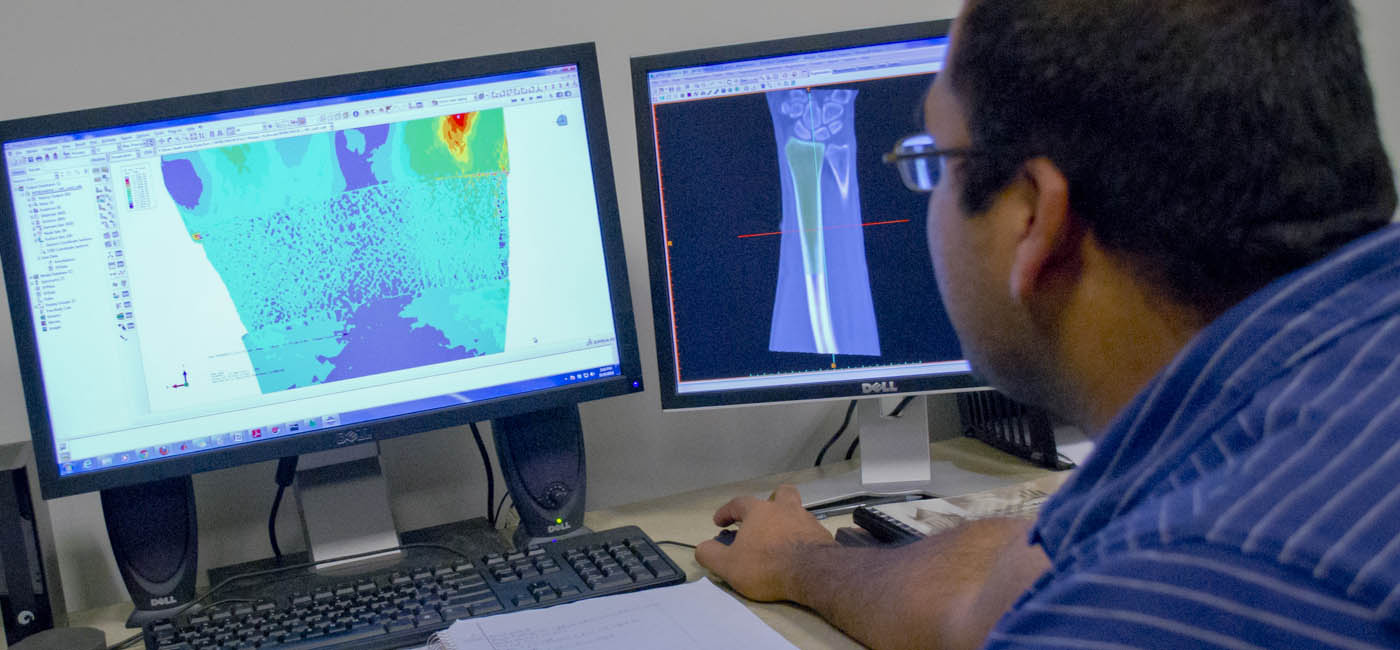Degree in Electrical & Computer Engineering
Take advantage of our long tradition of hands-on work as you complete your degree in Electrical and Computer Engineering. You’ll be immersed in cutting-edge projects that impact our world—like design of electronic circuits for use in wearable medical and health sensors, autonomous vehicles, solar-powered devices, and cybersecurity—from day one.
As you earn your degree in Electrical and Computer Engineering, you’ll explore the latest developments in everything from medical devices to cell phones and be inspired to improve it all. With guidance and encouragement from our world-class faculty, you’ll have the freedom to explore, learn, and research what fascinates you in our close-knit, supportive community.
Recent student project topics:
- Development of a solar powered electrocardiogram (ECG)
- Wireless electrocardiogram
- Traffic light detection and navigation for self-driving cars
- Semi-autonomous wheelchair
- Analysis of Intel processors for high throughput computations
- Radio communications for an unmanned (robotic) aerial vehicle
- Robotic sailboat
- Location detection using an "iBeacon"
- Side channel cryptosecurity assessment
- Solar panel maximum "power point" tracking for efficient solar power
- Real-time system for timing calibration of airborne radar
- Digital music synthesis

The Electrical and Computer Engineering Program offers a wide range of courses, allowing you to discover the specific fields that most interest you. Courses include a foundation in mathematics and basic science, as well as the design of electronic and computer circuits and systems. Our project-based approach will give you the chance to study new devices and techniques, then work with them right away in state-of-the-art labs. Whether you explore power systems and wireless networking or radio frequency and signal processing and instrumentation, a degree in electrical and computer engineering from WPI will give you the support you need to grow into a skilled, successful engineer and leader.
If you’re interested in earning a Master of Science in Electrical & Computer Engineering, you may also pursue a BS/MS degree and earn both in just five years.

Project-based Learning
WPI’s academic foundation is based on transformative hands-on experience. Working alongside high-achieving peers and renowned faculty, students apply their classroom knowledge to real-world problems so they adopt a broad cultural, social, technical, and scientific perspective of issues. As an electrical & computer engineering major, you may find yourself working on projects in areas like biomedical electronics, embedded systems, signal processing, robotics, microwave engineering, or cryptography.
More Value
Whether it’s real-world work experience through a co-op or internship, earning a bachelor’s and master’s degrees in four or five years through the BS/MS program, or integrating your coursework with your extracurricular interests through Major and a Mission, there are many ways you can make the most out of your time at WPI.
Explore Electrical & Computer Engineering with a Minor
Interested in Electrical and Computer Engineering, but not sure you want to commit to a full major? A minor in ECE will give you the chance to learn the basics with the flexibility to cluster courses—which range in everything from control and power engineering to signals, analog, and RG electronics—together thematically.
Get a Glimpse of the Future as an Electrical and Computer Engineer
Explore what an Electrical and Computer Engineer does, as well as electrical engineering salary information, career outcomes, and answers to other important questions on our career outlook page. It’s got all you need to start envisioning what your future will look like as a WPI graduate with a degree in Electrical and Computer Engineering.
Continue Your Education with a Master of Science in ECE (MSEE)
If you’re interested in building on your bachelor’s in Electrical and Computer Engineering, consider continuing your education with a Master of Science in ECE. Available both on campus and online, WPI’s Master of Science degree in Electrical and Computer Engineering offers extensive, rewarding research opportunities to help you advance your expertise in your specialty. Regardless of whether you study on campus or online, you’ll also have access to our world-renowned faculty and comprehensive, state-of-the-art facilities to complete groundbreaking, transformative research.
Earn a Graduate Certificate in ECE
Already have your bachelor’s in Electrical and Computer Engineering and ready to increase your expertise in the field? Consider earning a graduate certificate in Electrical and Computer Engineering, which will provide the training and experience needed to elevate your professional career. Whether you prefer to study on campus or online, our advanced certificates are comprised of four courses that you work with your advisor to select. Our online graduate certificate in Electrical and Computer Engineering is a perfect fit for those who have completed a BS degree in related fields and prefer the convenience and flexibility of online coursework.
Delve Deep into Electrical & Computer Engineering with WPI’s MEng
If you’ve set your sights on becoming an engineer,Continue your education with a Master of Science in ECE (MSEE). This highly specialized Master of Science in ECE features the same technical coursework as a master’s degree while allowing you to also focus some of your courses on business topics. No matter what you choose to focus on, you may customize the MEng program to meet your distinct goals.
Complete your PhD in ECE
Interested in building upon your education and experience even further? WPI’s PhD in Electrical and Computer Engineering offers all the support and facilities you’ll need to explore, investigate, and uncover groundbreaking research in the field. Work alongside dedicated faculty researchers and industry and government partners to explore the most compelling issues and critical problems—all while leveraging your own skills, passions, and expertise.
The Electrical & Computer Engineering Program is accredited by the Engineering Accreditation Commission of ABET.

